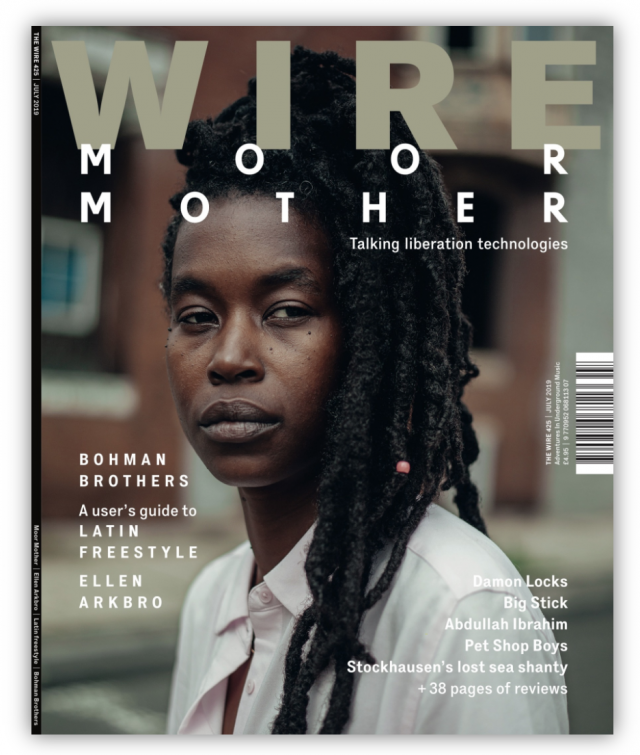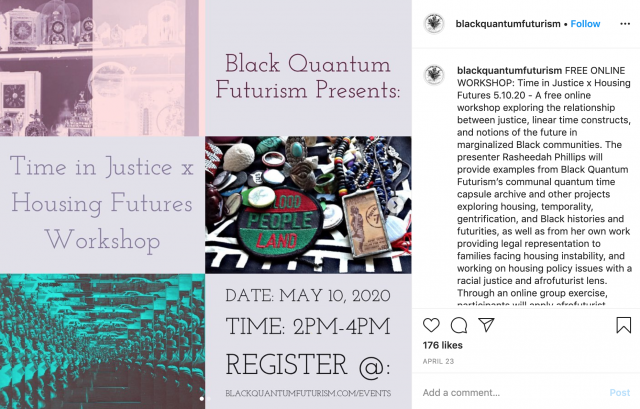Wednesday Investigation 07: Insurrectionary time, Black Quantum Futurism, and critical hope
"We can problematize time. The world is not finished."
I'm beginning my draft of this newsletter on May 30, five days after George Floyd died in Minneapolis after being pinned to the ground by white police officer Derek Chauvin. As I write, there are ongoing protests in several US cities, including not only Minneapolis, but New York, Los Angeles, Washington DC, Chicago, Philadelphia, Seattle, Dallas, and many others. It's a remarkable historical moment, and it's been difficult to turn away from the continuous coverage and discourse in order to attempt to write this newsletter.
Before these protests began, I'd been considering writing something about Danny Hillis & Stewart Brand's Long Now Foundation, an institution dedicated to fostering long-term thinking. They're an interesting organization--they've concocted various projects and provocations encouraging people to look at the world with a 10,000 year timeframe in mind--and there's a "Teaching the Long Now" syllabus out there that's loaded with supplementary readings and other materials that looks well worth investigating. But it felt like a privilege to don my ultra-long-view goggles in this specific moment, when there are so many people in the streets, putting their bodies on the line in order that we may collectively pay urgent attention to what is happening right now. It feels wrong to take the 10,000-year view when our repressive policing system costs people their lives nearly every day.
So we'll do that another time. Instead I returned to the notecard index for something tagged "investigate" but that might be cross-referenced with a different tag, relevant to the moment. I have tags for "power," "control," "resistance," "race," even a tag for the "repressive state apparatus"--and searching on some of those brought up some notes on radical historian / MacArthur Fellow Mike Davis, specifically notes taken from City of Quartz, Davis' astonishing Marxist analysis of Los Angeles.
City of Quartz has an important chapter on racialized policing, and I had made a note to look into some of the cases discussed. There's Eula Love, a 39-year-old widow shot 12 times by the LAPD in 1979 (the police claimed she threw a kitchen knife at them); there's an unarmed 19-year-old shot by the LAPD in 1988 on suspicion of gang activity; there's an 81-year-old retired construction worker shot in an Operation Hammer drug raid (no drugs were found, and speculation at the time was that the police were using the wrong address).
These stories shocked me--they will never not be shocking stories--but they also surprised me, at least in 2000, when I read City of Quartz for the first time. In our current moment the stories are no less shocking but I think it's hard for them to feel surprising: it's hard to feel surprised about the unarmed teen shot because the cops thought he might be a threat when we've had to contend, in the intervening years, with the stories of Trayvon Martin (age 18), or Sean Bell (age 23), or Amadou Diallo (age 23). It's hard to feel surprised about that retiree, shot when the cops went to the wrong address in 1988, because we're currently contending with the death of Breonna Taylor, killed when cops went to the wrong address just 17 days ago. (I donated to the GoFundMe that supports Taylor's family, and I encourage you to do the same.)
There is one surprising thing, perhaps, which is that the stories recorded in Quartz didn't become bigger news at the time: there's some writing on Eula Love out there but the other cases barely even exist in the historical record, testimony to the cultural disregard paid in a pre-Rodney King, pre-Black Lives Matter era. Interestingly, until some post-Black Lives Matter initiatives began to take hold, nobody even really knew how many Americans the policing system was killing each year. Good numbers have been maintained each year since the shooting of Michael Brown (age 18) in Ferguson, although it remains impossible to find data on how many of those cases were killings of unarmed or otherwise innocent individuals. (If you want to think hard about whether "innocence" should even matter in the question of whether cops should be allowed to kill black men, check out Against Innocence, a short polemic by Jackie Wang, published as a standalone text and also included in her book Carceral Capitalism.)
In any case. Davis had been on my mind already, as I'd been watching this week's protests and recalling Davis' endearing refusal to use the term "riot," both in City of Quartz and elsewhere. When discussing the 1965 unrest in Watts (also incited by police violence), he always refers to it as the "Watts Rebellion." Also this week, I learned that House Representative Maxine Walters, in a similar vein, declined to use the word "riot" back in 1992, during the unrest following the Rodney King verdict, referring to it instead as a political "insurrection."
So that got me thinking tonight about insurrections, and so I ran a search for notes containing the word "insurrection" that were also tagged "investigate." What came up was Black Quantum Futurism, a Philadelphia-area art collective comprised of two people: the science fiction writer Rasheedah Phillips and the experimental musician Camae Ayewa, who records under the name Moor Mother (she was featured talking about "liberation technologies" in a cover story at The Wire last summer, and the magazine's website hosts a stream of her Homegirls & Handgrenades mix).

Together as BQF, Phillips and Ayewa explore "the intersections of futurism, creative media, DIY-aesthetics, and activism in marginalized communities through an alternative temporal lens."
An alternative temporal lens felt like exactly what I was looking for--not the Long Now, with its logic of time-as-we-know-it extended for another 10,000 years, but something altogether different, something more in line with the disruptive, liberatory spirit of the week. My note on BQF came courtesy of a tip from Johanna Hedva--an experimental musician and author in their own right--who praised some of the BQF publications in an end-of-year list at The White Review. In their praise for a BQF anthology, Space-Time Collapse I: From the Congo to the Carolinas, Hedva draws special attention to the anthology's overarching theme, namely, that time itself can be thought of as an white/ideological construct, which, like any other, can be resisted, reconsidered, or overthrown.
This theme, which, Hedva notes, is "insurrectionary [...] on every scale, from the quantum to the cosmic," is central not just to that anthology, but to the BQF project itself. The BQF blog has analyses of recent films that deal with time displacement and "Afrodiasporan temporal landscapes"; their shop features a mini-zine on DIY time travel; earlier this month they ran an "online workshop exploring the relationship between justice, linear time constructs, and notions of the future in marginalized Black communities."

Phillips' book, Recurrence Plot and Other Time Travel Tales, clearly signals its concern with this issue as well, not only in its title but even more explicitly in its editorial description: "The interweaving stories in Recurrence Plot and Other Time Travel Tales present characters whose experiences challenge the notion that time flows in only one direction." Elsewhere, Phillips has described the past as a site of "open possibility, speculation, and active revision."
All of this aligns BQF with a powerful lineage of Afrofuturist thinking, which has long engaged with the notion that time represents a kind of oppressive force that can be fruitfully subverted (for a great look at how Afrofuturist music explores this theme, check out John Corbett's great essay on Sun Ra, Lee "Scratch" Perry, and George Clinton, which appears in his book Extended Play: Sounding Off from John Cage to Dr. Funkenstein). But it also puts BQF in line with other progressive traditions, including liberation theology and even critical pedagogy.
I've been reading in those disciplines this week because I currently belong to a book group that's been reading a variety of progressive texts that might shed some light on the events of 2020 (we began with Naomi Klein's The Shock Doctrine, to give you some idea). But this week we did some readings about the concept of hope, which brought us to the socialist Christian educator Paulo Freire.
I was particularly struck by a passage, in Freire's final book, Pedagogy of Freedom, where Freire notes that "[t]he world is not finished. It is always in the process of becoming." This should be cause for hope, he argues: "Hope is a natural, possible, and necessary impetus in the context of our unfinishedness. Hope is an indispensable seasoning in our human, historical experience. Without it, instead of history, we would have pure determinism. History exists only where time is problematized and not simply a given. A future that is inexorable is a denial of history."
We can problematize time. The world is not finished. The past can be reclaimed; the future is unmade. There is hope.
However, let us here recall the words of another thinker on these issues, Dr. Cornel West, who makes an important distinction between hope and optimism. In remarking on this distinction, Dr. West notes that "[h]ope and optimism are different. Optimism tends to be based on the notion that there's enough evidence out there to believe things are gonna be better, much more rational, deeply secular, whereas hope looks at the evidence and says, 'It doesn't look good at all. Doesn't look good at all. Gonna go beyond the evidence to create new possibilities based on visions that become contagious to allow people to engage in heroic actions always against the odds, no guarantee whatsoever.' That's hope. I'm a prisoner of hope, though. Gonna die a prisoner of hope."
Cornel West, incidentally, appeared on CNN this week, in a remarkable segment, in which his brand of critical hope is continuously on display: I recommend checking it out.
-JPB // Dedham, MA, May 31-June 1 (revised Wednesday, June 3)
![Wednesday Investigations [2:15]: Blind spots, part two](/content/images/size/w960/2025/05/jeph-jerman.jpg)
![Wednesday Investigations [2:14]: Blind spots](/content/images/size/w960/2025/05/takehisa-kosugi.jpg)